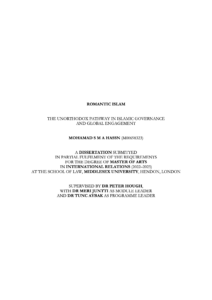المؤلف: محمد الميل – الناشر: غير متوفر – عدد الصفحات: 26 – ملاحظة: أطروحة بحثية مقدمة لاستكمال متطلبات الحصول على درجة الماجستير في العلاقات الدولية، 2022-2023، كلية الحقوق، جامعة ميدلسكس، هيندون، لندن – إشراف: الدكتور بيتر هوغ
الملخص:تطور هذه الورقة البحثية إطارًا لفهم “الإسلام الرومانسي” كظاهرة معاصرة يتنقل من خلالها المسلمون المعاصرون في منطقة رمادية، حيث يواجهون تحديًا في التوازن بين متطلبات الحداثة وواجباتهم الدينية، وغالبًا ما يؤدي ذلك إلى صراع ديونطولوجي أثناء سعيهم للتوفيق بين توقعات كلا الجانبين.
Title: Romantic Islam: The Unorthodox Pathway in Islamic Governance and Global Engagement – Author: Mohamad Al-Mail – Publisher: N/A – Page Numbers: 26 – Note: A research submitted in partial fulfilment of the requirements for the degree of MA in International Relations, 2022-2023, School of Law, Middlesex University, Hendon, London – Supervisor: Dr. Peter Hough
Abstract: This scholarly paper develops a framework for understanding Romantic Islam as a contemporary phenomenon in which modern Muslims navigate a nuanced grey area, grappling with the challenge of balancing the demands of modernity with their religious obligations. This often results in a deontological struggle as they endeavour to harmonise the expectations of both realms.
Condensed and Revised Version:

